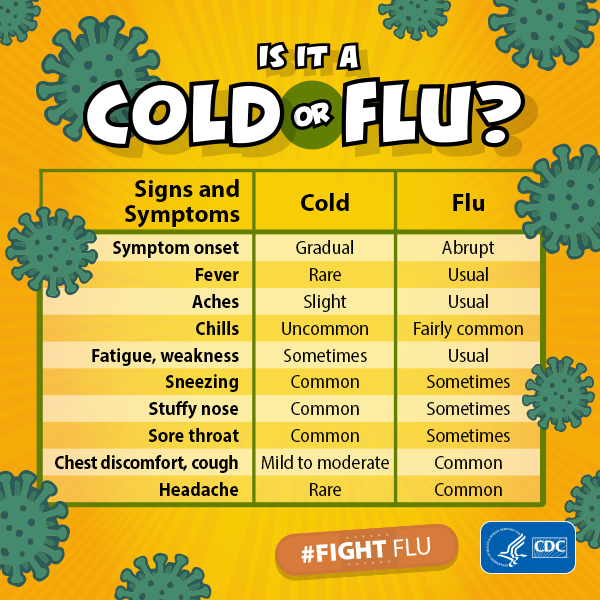As the seasons begin to change, we can expect football season, pumpkin-flavored everything and the dreaded beginning of flu season. Follow along as we break down what the flu is, fast facts, symptoms, prevention, tips and risks.
What is the flu?
The flu, or influenza, is a virus that causes respiratory illness. The flu is highly contagious and is typically spread person to person by sneezing or coughing. Adults with the flu are actually contagious 1-2 days before experiencing symptoms and up to 7 days after becoming ill.
What are the symptoms of the flu?
The flu and the common cold are often confused. However, there are distinct differences. Despite both being caused by viruses, they are very different. Generally speaking, the symptoms of colds are milder than that of the flu and complications are more common with the flu. The chart below, from the CDC, details a few more differences. It is important to note that symptoms may vary from person to person.

What are the treatment for the flu?
Antibiotics - Because the flu is caused by a virus, antibiotics typically cannot help. However, antibiotics may be used in conjunction with other therapies if the flu has led to an illness caused by bacteria, such as an infection.
Antivirals – There are several antiviral medications approved by the FDA. These medications are typically only prescribed if a patient is over 12 years of age and has had symptoms for 48 hours or less. As with any medications, discuss with your doctor the possibility of side effects.
Over the counter pain relief – Common pain relievers such as acetaminophen and ibuprofen can be used to help ease uncomfortable symptoms related to flu such as body pains and headache.
Other steps – Be sure to follow the following recommendations if you have the flu:
- Stay home and avoid contact with other people
- Drink plenty of liquids
- Eat small snacks and meals when possible
- Keep warm
- Get plenty of rest
- Avoid alcohol and smoking
Are there risks associated with the flu?
For most people, the flu is very unpleasant but does not pose risks of serious complications. However, for some, complications can be severe.
These complications can include:
- Severe dehydration
- Bacterial pneumonia
- Worsening of cardiovascular disease
- Worsening of asthma
- Complications with diabetes
Typically, these complications are more common in:
- Children younger than five years of age (especially those under 2)
- Older adults
- Those with weakened immune systems
- Pregnant women and those up to 2 weeks postpartum
- Patients with cardiovascular disease
- Diabetics and those with blood, kidney, liver or other metabolic disorders
- Patients with asthma or chronic lung disease
- Patients with bronchitis
- Patients undergoing cancer treatments
If you fall into one or more of the high-risk categories above, you may want to call your doctor on the onset of symptoms that you feel may be related to the flu. Other reasons to contact your doctor may be if your symptoms worsen, if you experience shortness of breath or chest pain, or if your fever lasts more than 3 days.
How can I prevent the flu?
The single best way to help protect yourself from the flu is by receiving the flu vaccine each year. Generally, these vaccines become available each year in the fall. There are two types of vaccinations, the traditional injection and a nasal-spray vaccine.
The traditional flu shots use either an inactivated (or killed) version of the virus or a single gene of the virus that cannot cause an infection. The nasal spray does use a live virus, however, it is greatly weakened and is only designed to multiply at the temperatures within the nose. Higher body temperatures, such as the lungs, will not allow the virus to replicate or cause infection.
There are many types of the flu virus and they constantly change, or mutate. Each year, the vaccines change in order to effectively combat the flu, as well as possible.
There are some people who should not be vaccinated, which include those under 6 months of age, those allergic to the ingredients in the vaccine and those with a few other immune conditions. Be sure to talk to your doctor if you are concerned that the flu vaccine may not be for you.
In addition to the vaccine, here are a few other healthy steps that may help ease the spread of germs in flu season, and all year round.
Wash your hands – Handwashing is vital for health. When soap and water are not available, use an alcohol-based hand sanitizer.
Stay home – Please help prevent the spread of illness by staying home, when possible, when you are sick.
- Avoid touching face – Germs are commonly spread by a person touching something contaminated and then touching their own mouth, nose or eyes.
- Avoid contact – Try to avoid close contact with anyone who is sick.
- Cover your mouth and nose – Many illnesses, including the flu, are spread by sneezing, coughing and unclean hands. Try to cover your mouth and nose when sneezing or coughing with a tissue to help prevent the spread of germs. Then, promptly clean your hands.
- Disinfect surfaces – Frequently disinfect and clean surfaces that may come in contact with germs.
- Live healthy – Try to live an active lifestyle with a healthy diet and plenty of fluids.
According to the CDC, Centers for Disease Control and Prevention, on average 8% of the US population will contract the flu each year- that is more than 26 million people! But you can help! Please do your part to help prevent the spread of the flu by getting vaccinated each year and maintain healthy lifestyle habits. Talk to your doctor today about scheduling your flu shot today!
For more informative information and blogs, be sure to “Like” and follow us on Facebook, Instagram and check our “Blog” page weekly!


